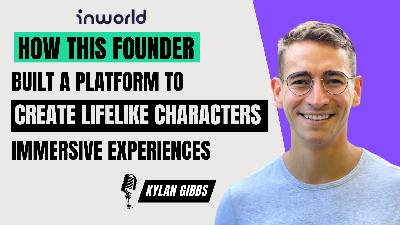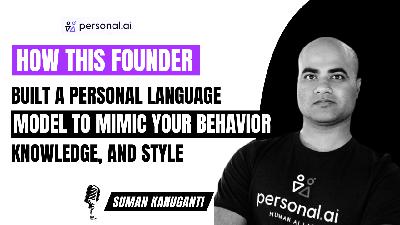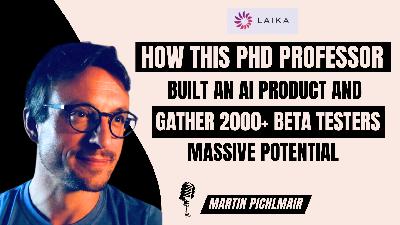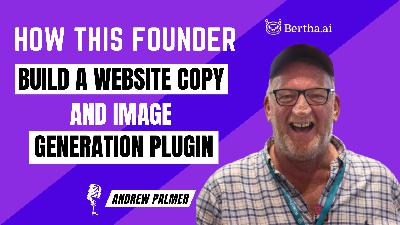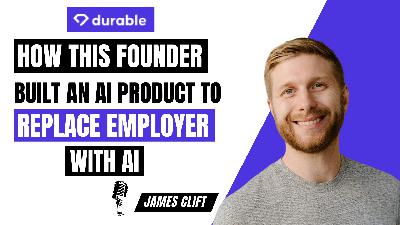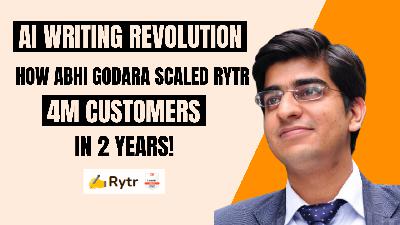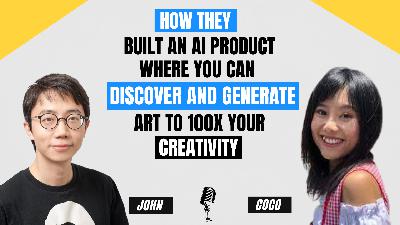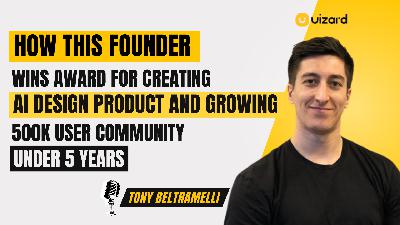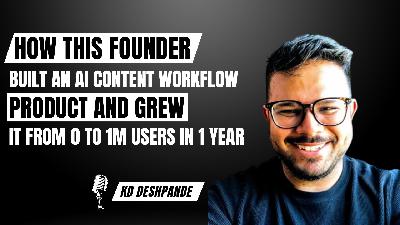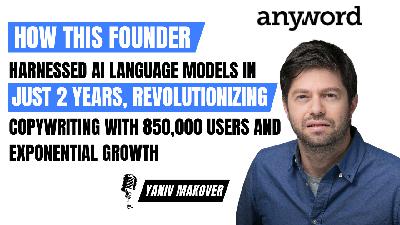This founder built an AI product to help writers beat creative block and generates over $750k ARR.
Description
Find the full transcript at: https://www.aiproductcreators.com/
Where to find Amit Gupta:
• LinkedIn: https://www.linkedin.com/in/amitgupta/
Where to find Dhaval:
• LinkedIn: https://www.linkedin.com/in/dhavalbhatt
In this episode, we cover:
00:00:00 - Introduction to Amit Gupta and Sudowrite
00:02:37 - Sudowrite's capabilities and how it helps writers
00:04:12 - AI writing assistance: Assisting vs. Replacing writers
00:08:41 - Sudowrite's goal of supporting writers in their entire journey
00:09:17 - Building on top of pre-trained models vs. training custom models
00:10:58 - Fine-tuning pre-trained models for new AI products
00:11:42 - The future vision of Sudowrite: Turning individual writers into franchises
00:13:08 - Sudowrite's seed round funding and bootstrapping experience
00:14:11 - Inspiring new AI product creators to start their own projects
Transcript:-
Dhaval: This founder built an AI product to help writers beat creative block. He's a former writer himself, and in this episode we talk about how to approach building AI products in 2023 and beyond. Specifically, Amit shares his journey of how he launched in August of 2022 and generated a profitable company within a short amount of time with long enough runway. To allow his team and himself to chase the product vision without having to raise multiple rounds of capital. Amit Gupta and his team are building. AI writing tool called Sudowrite. He's a former founder of Photo jojo, a product that he grew to 10 million a year and sold in 2014. After taking a break for a few years, he launched Sudowrite in August of 2020. An app to help create a writers use AI to beat writer's blog.
Talk to us, Amit. Tell us about your product, your market segment, your ideal users. I would love to hear about it.
Amit:
Sure. Our product is called Sudowrite and we're building an AI writing tool for creative writers, people who are writing novels, screenplays, any kind of creative story-based narrative content. And today our audience is those individual creators, and I think in the future, We really want to create a story engine, something that helps anyone who wants to tell a story. So that could be any of the people in the world who always thought they had a novel inside of them. It's too much work. It's too hard to get that novel out. We want to make it easier.
Dhaval:
Very cool. Tell us a little bit about how you got onto this idea. I know you are a very prolific writer yourself. How did you come up to wanting to solve this problem? And tell us a little bit about your background that you were willing to share with us.
Amit:
Sure. Yeah. I've started a couple companies in the past. The last company I started, I sold in 2014. Then I decided to take some time away from Tech. I left San Francisco, I traveled and I really decided I wasn't going to do the same thing again. I was going to try something different. So I ended up writing and I spent a few years writing fiction, which is where I met my co-founder in a writing group. And as we were writing fiction, we were bemoaning how much harder it was in running startups because, Man, you get no feedback. It's in a startup, you launch something, right away if it's working, your users will tell you, you'll see it in the numbers. And with writing, it can take weeks or even months to get a few pieces of subjective feedback on a longer form piece. So it's a very different world, much different kind of Learning curve. And we wanted to find a way to bring some of the rapid iterations and the ideation, some of the collaborative elements of working in tech or on a startup to the writing process.
Dhaval:
Very interesting. What was the process like for you to build your MVP? Did you start with wanting to build an AI first creative workflow, or was it writer first and then add AI to it? Tell us a little bit about how you did your MVP.
Amit:
Yeah, we were definitely AI first. My co-founder James started playing with GPT-3 when he came out a couple years back. A few years back. And originally we weren't planning to start a company. We were just making a tool for ourselves and for our writing group. And then we shared it with some other writers that we knew and respected. And we just got incredible feedback. So we kept tinkering with it. If I think about a year before we decide to really turn it into a company, It was for that year just a hobby project. A lot of writers that are we knew were using it. And we didn't focus on a lot of the features that most writing tools had. We focused on the things that were unique Sudowrite, the places where we could bring AI to the process and do something new.
Dhaval:
Very interesting. Did you build on top of chat GPT-3 or was that a private beta at that time? How did you get access to that? Tell us all the juicy details of how did you integrate AI in your workflow? And what was the product market fit experience like that like for you?
Amit:
Sure. So this was back in 2020. GPT-3 had just come out. It wasn't widely available. I think we DM Greg Brockman to see if we could get access and we just wanted it to play with as writers for our writers' group. So he gave everyone in the writers' group access, and started playing around with it. Eventually we started building on top of it.
Dhaval:
So where are you in terms of your product? Do Have you launched your MVP do you have revenue? Do you have certain number of users? Yeah. Tell us a little bit about that.
Amit:
Yeah, product-wise, we started building it in. I think like August or July of 2020. And we started letting people in shortly after that. We started charging people, I think last year or late the l year before, not that long ago. So it's been on the market for a bit now. And I think it's grown steadily throughout the history. As soon as we started charging for it, people started to sign up. We don't have a freemium options it's all paid. And we've really kind of seen it hit product market fit in the last couple months, or at least what we think is product market fit. It's in the past couple months where I think we've seen a lot of people signing up, a lot of people kind of entering the community, asking for things, suggesting things that are rate where like it no longer feels like we're pushing it up a hill. It feels like we're chasing the ball down the hill trying to catch up. So it's a, that's a cool feeling. It's a very quick reversal.
Dhaval:
Yeah. And do you have any numbers that you can share with us? The number of users you have, your revenue and daily active users or any of that data points? Cause we do have investors also listening to this. So, perhaps they can connect with you if you're willing to share that. Totally up to you. I understand that.
Amit:
Sure. Yeah. I don't wanna share too much, but we did share recently that we hit 500K in ARR in December, and I think we're above 750k right now.
Dhaval:
Wow. Wonderful. Do you have any data points around the number of users you have or market shares or rather market segments that you are going after? Any of that information?
Amit:
Yeah. In terms of market share, I think we obviously have hit like a very, very, very tiny fraction of the market so far. These are really the early adopters. The folks that are willing to experiment with new technology. I think there's a lot of grounds still to be covered. A lot of things, frankly, we have to improve about the product before it's really going to be something that someone who is used to a very polished writing experience is going to want to use. But today it's useful to a lot of people. And I think the market is You know all these people who consider themselves writers, but like I said, in the future, I think that almost anyone who reads has a story in them. So there's a lot of additional people we think we can bring into the market.
Dhaval:
Yeah, writing is such a fundamental thing, right? Once you figure out writing, you can create many other things on top of it. So I have like two questions that come to my mind. I'll ask the first quest



